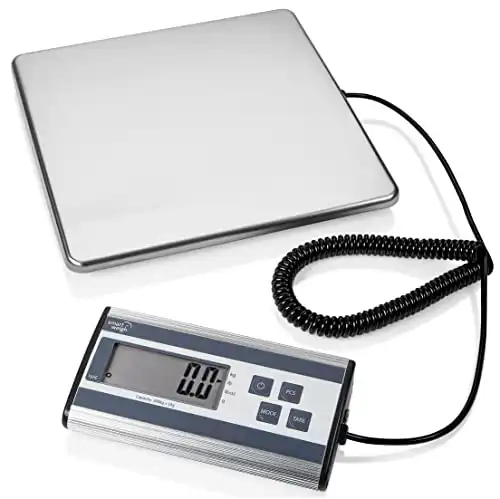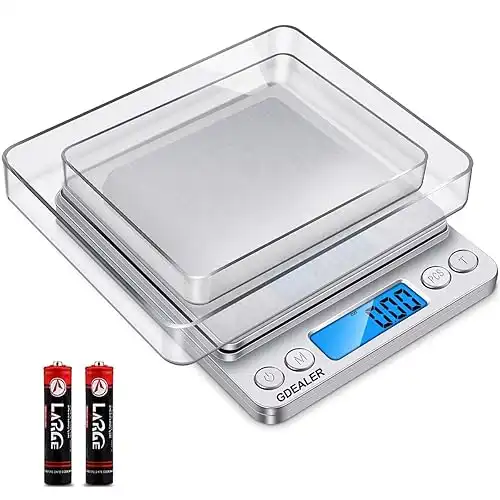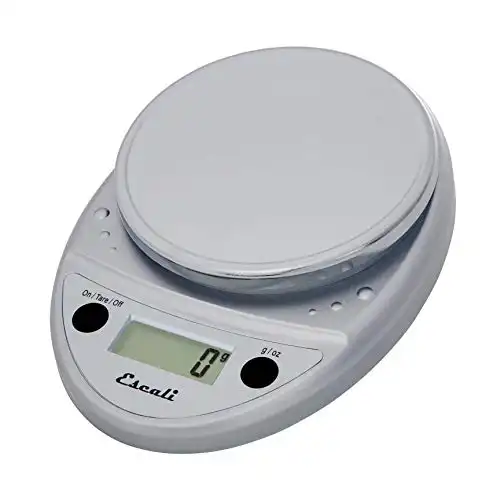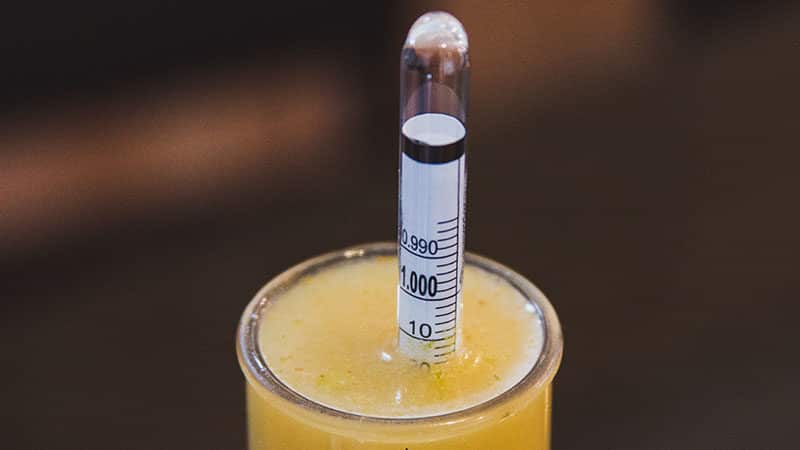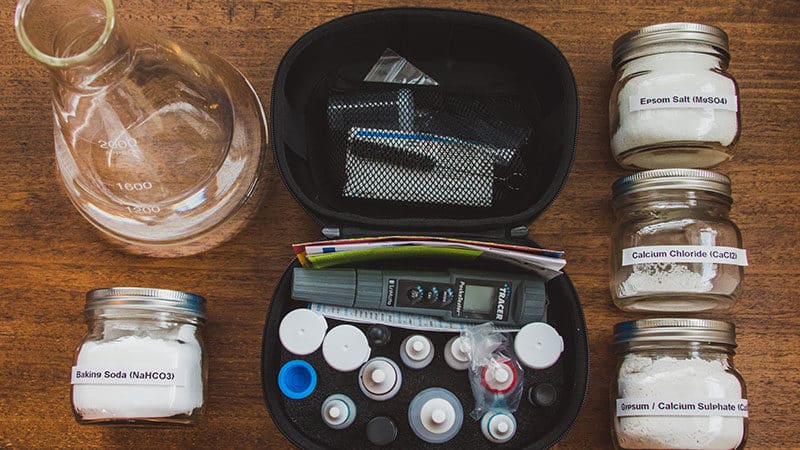Just like cooking and baking, brewing requires precise measurements for success. And the best way to do that for homebrewing is to measure in weight rather than cups or tablespoons because it’s more accurate.
So if you’re ready to brew more precisely and be able to easily replicate complex recipes, just as you’ve invested in other essential equipment, it’s time to invest in a digital brewing scale.
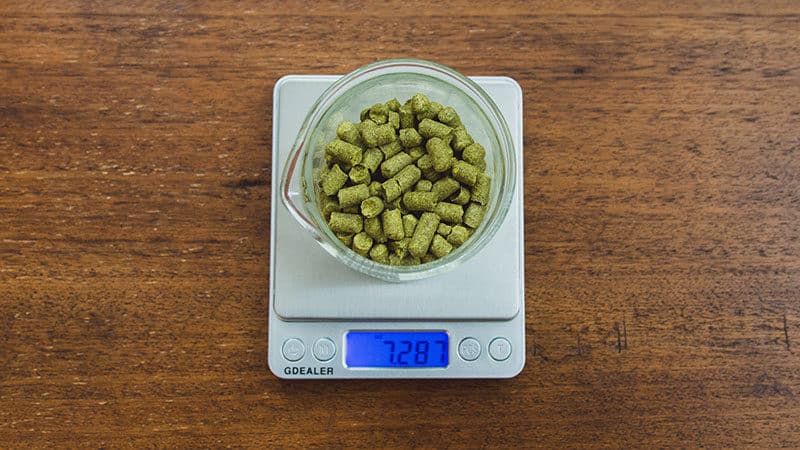
The Best Brewing Scale for Grains
If you’re using a typical kitchen scale to measure your grains, chances are you’re measuring in batches. But if you’re not? Well, if your recipe calls for 8.5 pounds of grain, and your kitchen scale capacity is five pounds, your measurements will most likely be inaccurate.
Because we tend to measure grains in pounds rather than grams or ounces, you need a scale that can weigh heavier objects accurately. Another consideration when counting grains is a larger plate, so you can fit whatever vessel you’re using to hold the grain without blocking the digital readout.
Perfect for brewers who need to weigh and mill their own grain. With a 440-pound capacity (which is more than you'll ever need), this scale is reliable and accurate. The extendable display cord makes it easy to read the weight. Plus, the built-in auto-off function preserves battery life.
The Best Brewing Scale for Hops and Brewing Salts
We tend to measure hops in grams since we use much smaller quantities of pellets compared to grains. So, instead of higher weight limits, we’re looking for more precise measurements. That’s not to say scales that only measure in pounds and grams are bad options; it’s just something to consider if you want higher accuracy.
You probably don’t need a scale that measures anything below a gram (unless you’re doing some crazy flavor concoctions), but some of our favorite scales do just that.
There are two scales that I like. The main one I use in my home brewery for measuring hops and brewing salts is this small jewelry scale. It’s a beast! I’ve had it for 6 years and still haven’t changed the batteries. And I know many other homebrewers who use this same scale.
This scale is perfect for measuring hops, minerals, brewing salts, and other small amounts. It's super accurate and feels like it never runs out of battery power.
Ready to improve your all-grain brewing process and dial in your system?
This video course covers techniques and processes for water chemistry, yeast health, mashing, fermentation temperature, dry-hopping, zero-oxygen packaging and more!
Click Here to Learn MoreThe Best Digital Scale For Measuring Adjuncts
In my kitchen, I rely on the Escali Primo. I’ve tested many kitchen scales from brands like OXO, Greater Goods, Hario, and more. And after using the very inexpensive Escali, I was blown away.
It’s super accurate, always stays on, and seems to never run out of battery power. I use it for measuring fruits, flour, and other larger brewing ingredients less than 10 pounds.
This scale can precisely weigh between one gram and 11 pounds. It's an easy-to-operate brewing scale for hops and adjuncts. It runs on AA batteries and offers a lifetime warranty against defects under normal use.
How Digital Scales Work
Measuring how heavy an object is might sound simple, but the mechanics of a digital scale are more complicated than you may think. Why? Because weight is relative.
Digital scales aren’t actually measuring the weight of the item so much as the pressure the item exerts on the load cell. Most of the brewing scales we use will only have one cell, which is made up of wires and strain gauges, while industrial scales can have between four and eight load cells.
When you weigh your grains, hops, or adjuncts on a digital scale, those strain gauges in the load cell compress and generate a small electric charge. That information is converted to a digital format and sent to a microprocessor control unit, which analyzes the data and displays it as a measurement of weight.
Types of Brewing Scales
We really only care about two types of scales in homebrewing. The first is a tabletop or bench scale. If you already own a scale, chances are this is what you have. A tabletop is usually a flat scale. It trades some accuracy for portability and ease of use, but it’s still a solid choice for non-scientific weighing. However, these scales may struggle to accurately weigh heavier objects.
This brings us to the second important type of brewing scale: a crane scale. As the name implies, crane scales weigh objects hanging from a hook. The drawback is you need a loop or chain around whatever you’re weighing, but the bonus is crane scales can weigh much heavier objects more accurately.
If you brew in smaller batches, you probably won’t need a crane scale, which can handle upwards of 100 pounds. But it’s good to know it’s there if you ever need it.
Tabletop and crane scales aren’t the only types of scales out there, but they are the most common types of brewing scales you’ll work with.
Crash Course on Taring and Weight Range
If you know your way around a brewing scale, feel free to skip ahead. If you’re new to measuring anything other than yourself on a bathroom scale, stick around.
Taring a Scale
When you use a digital scale for your brewing ingredients, you’re not just throwing all your malt onto the scale. (Think of how messy that would be.) You need a vessel to hold whatever you’re measuring while not measuring the vessel at the same time.
This calibration process is called taring. Basically, you’re zeroing out the scale so it weighs only the ingredients and not the vessel. Look for a digital scale with a tare option—it means less math for you.
Scale Weight Range
Unless you’re into some seriously small-batch brewing, you can skip the super-fancy scales that measure by extremely tiny amounts like micrograms.
Even when you’re dealing with flavor additions, you probably don’t need anything that can measure under a gram—although the option is both common and relatively inexpensive.
You do, however, need to be conscious of your scale’s capacity. We typically measure our grains by the pound. Scales become less accurate if you weigh above the recommended range.
So make sure to take note of the typical weight of grains in your recipes before buying a scale. Remember, it’s better to be under than over.
You’re on Your Weigh to Accurate Measurements
Your homebrewing toolkit isn’t complete without a digital scale. Remember, you don’t have to buy a dedicated brewing scale to get the job done. Just make sure you find a scale that meets the weight requirements of your recipes and you’ll be fine.
Happy Brewing!
